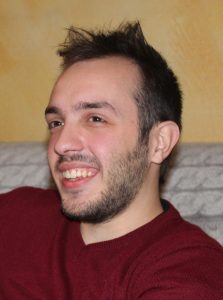 Loïc Moczko (Postdoc, Eindhoven University of Technology)
Loïc Moczko (Postdoc, Eindhoven University of Technology)
I started the Magistère of Fundamental Physics after a two-years program called in-depth mathematics and physics (MPA), that proposes two natural follow ups: maths or physics. For me, it was without a doubt that I chose physics and launched myself into the magistère of fundamental physics, that I see a bit like a “enhanced master program that starts in bachelor”.
The courses are mostly the same as the bachelor and master ones, but with additional elective courses (sometimes with mandatory topics)… The way that these additional courses are taken into account is one of the biggest strength of the magistère: the grades are separated from the ones of the national degree (bachelor/master). Thanks to this, there is no need to think about how hard a course can be as a bad grade would not put the national degree at risk. The few courses that are specific to the magistère are among the most in depth and interesting ones I had during my time in university. Most of them are closely related to the courses of the main path. They do not only present new concepts but give new interpretations and formalisms to gain a better understanding of the physics seen in the main courses.
I finished the magistère with a MCN master (condensed matter and nanophysics, previous version of the PhyQS master) and continued with a PhD thesis in experimental physics at IPCMS (Institut de Physique et Chimie des Matériaux de Strasbourg) on a project that aims to combine optical spectroscopies and nanomechanics to study twodimensional materials (graphene, TMDs…). I defended my PhD in March 2023.
I am now a postdoctoral researcher at the Eindhoven University of Technology, where I learn new ways to use optical spectroscopy for studying ultrafast heat transport processes that occurs in twodimensional materials. Both this project and the one of my PhD work are mixing many different concepts for various fields of physics, that I am able to tackle thanks to the solid basis that I built with the diverse and high level of the magistere and master courses (that I still consult sometimes). I recommend both the MdPF and the master PhyQS to anyone interested in physics research.